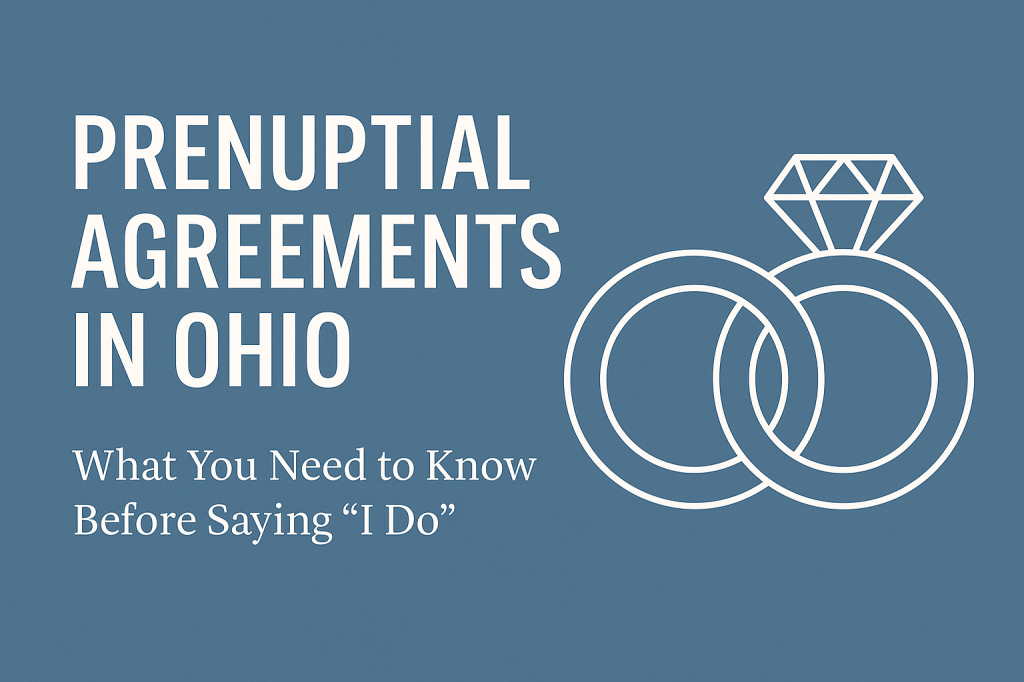Prenuptial Agreements in Ohio: What You Need to Know Before Saying “I Do”
- Jul 31
- 5 min read
Updated: Aug 10
By Andrew Russ, Columbus and Athens Family Law Attorney

Marriage is not only a romantic union but also a legal and financial partnership. While no one enters a marriage expecting it to end, many couples are recognizing the practical benefits of establishing clear agreements in advance. A well-drafted prenuptial agreement (or "prenup") can help protect your financial interests, define asset ownership, and reduce the likelihood of disputes in the event of a divorce. In Ohio, prenuptial agreements are legally enforceable under certain conditions—but they must meet specific legal standards to be valid.
This article explores prenuptial agreements in Ohio from every angle—what they are, how they work, when they’re valid, and why consulting with an experienced Ohio family law attorney is essential to ensure your agreement will stand up in court.
Table of Contents
What Is a Prenuptial Agreement?
Are Prenuptial Agreements Legal in Ohio?
Why Consider a Prenup in Ohio?
What Can You Include in a Prenuptial Agreement?
What Can’t You Include in an Ohio Prenup?
Legal Requirements for Enforceability in Ohio
Common Mistakes to Avoid
What Happens If You Don’t Have a Prenup?
How an Ohio Prenuptial Agreement Lawyer Can Help
Conclusion
Related Blog Posts
What Is a Prenuptial Agreement?
A prenuptial agreement is a written contract entered into by a couple before marriage that outlines how financial and property matters will be handled during the marriage and in the event of a divorce or death. It can address a wide range of topics, including:
Division of assets and debts
Treatment of separate and marital property
Spousal support (alimony)
Inheritance rights
Management of business interests
Debt responsibilities
In Ohio, prenuptial agreements are recognized by law and are commonly used not only by high-net-worth individuals but also by couples looking to establish financial clarity and avoid future conflict.

Are Prenuptial Agreements Legal in Ohio?
Yes, Ohio law permits and enforces prenuptial agreements, also known as antenuptial agreements, provided that they meet certain legal criteria. Ohio courts have upheld prenups as long as they are entered into voluntarily, with full financial disclosure, and without fraud or duress. Key case law such as Gross v. Gross, 11 Ohio St. 3d 99 (1984), confirms the enforceability of these agreements in Ohio.
Why Consider a Prenup in Ohio?
There are several reasons why couples in Ohio may choose to enter into a prenuptial
agreement:
1. Asset Protection
If you own a home, business, investments, or other significant assets, a prenup helps ensure they remain separate property.
2. Debt Protection
A prenup can protect one spouse from becoming responsible for the other’s pre-existing debts, such as student loans or credit card debt.
3. Business Interests
If one or both parties own a business, a prenup can protect the company from being divided or sold in a divorce.
4. Second Marriages
Prenups are especially important in second marriages, where one or both spouses have children from prior relationships and wish to preserve their inheritance rights.
5. Alimony/Spousal Support Provisions
You can agree in advance on whether spousal support will be paid—and if so, how much and for how long.
6. Clarity and Communication
Creating a prenup forces couples to discuss financial expectations, which can lead to a healthier, more transparent marriage.
What Can You Include in a Prenuptial Agreement?
Ohio allows couples to address a wide range of financial matters in their prenups. Some common provisions include:
Identification and protection of separate property
Rules for dividing marital property in a divorce
Rights to real estate or family heirlooms
Allocation of debts and liabilities
Alimony or spousal support terms
Business ownership or income protection
Retirement accounts and pension plans
Life insurance policy beneficiaries
As long as the terms are not illegal or against public policy, courts generally allow couples to determine their own financial arrangements.
What Can’t You Include in an Ohio Prenup?
Certain provisions are not enforceable in a prenuptial agreement under Ohio family law:
Child Custody or Child Support: These issues cannot be predetermined. Courts always retain the authority to decide custody and child support based on the child’s best interests.
Unconscionable Terms: A prenup that heavily favors one party in a way that is grossly unfair may be deemed invalid.
Encouragement of Divorce: A clause that incentivizes divorce (e.g., a bonus payment if a spouse leaves) will not be enforced.
Lifestyle Clauses (sometimes): Provisions like requiring a spouse to maintain a certain weight or appearance are generally frowned upon and often deemed unenforceable.
Legal Requirements for Enforceability in Ohio
Ohio courts apply a three-part test to determine whether a prenuptial agreement is enforceable. The prenup must:
1. Be Entered into Freely Without Fraud, Duress, or Coercion
Both parties must enter the agreement voluntarily and without undue pressure. Signing a prenup the day before the wedding, for example, may raise questions of duress.
2. Include Full Disclosure of Assets and Liabilities
Each party must provide a full and honest disclosure of all their financial information—assets, debts, income, and obligations—before signing.
3. Be Fair and Consistent with Public Policy
While prenups don’t have to be exactly equal, they cannot be so one-sided as to be considered “unconscionable.” Fairness is measured at the time of execution.
Courts may also look at whether each party had independent legal counsel—and although not required, having separate attorneys for each party is highly recommended to avoid future challenges.
Common Mistakes to Avoid
Poorly drafted or executed prenuptial agreements are vulnerable to being set aside in court. Here are common pitfalls to avoid:
Waiting until the last minute to sign
Failing to disclose all assets or debts
Using vague or ambiguous language
Not updating the prenup after major life changes (e.g., birth of a child)
Using a do-it-yourself template without legal review
Not having separate attorneys for each spouse
Having an experienced Ohio prenuptial agreement attorney draft or review the agreement is the best way to ensure its validity.
What Happens If You Don’t Have a Prenup?
Without a prenuptial agreement, your financial future in the event of a divorce is governed entirely by Ohio divorce law, which includes:
Equitable distribution of marital property (which may not be equal)
Division of retirement accounts and pensions
Potential spousal support obligations
Court-determined distribution of debts
Possible business division or sale
For many people, this “default system” may not reflect their values or financial expectations. A prenup allows you to opt out of Ohio’s default rules and create your own roadmap.
How an Ohio Prenuptial Agreement Lawyer Can Help
Working with a skilled family law attorney in Ohio is crucial to ensuring your prenuptial agreement is legally valid and tailored to your unique needs. At Andrew Russ Law, we help clients:
Understand Ohio’s prenuptial agreement laws
Clarify individual and shared financial goals
Draft enforceable and customized prenups
Review existing prenuptial or postnuptial agreements
Negotiate terms respectfully and constructively
Avoid legal pitfalls that could render the agreement invalid
We offer thoughtful, strategic counsel to protect your assets, clarify your rights, and strengthen the legal foundation of your marriage.

Conclusion
A prenuptial agreement in Ohio is not just for the wealthy—it’s for any couple that wants to enter marriage with clarity, transparency, and peace of mind. Whether you are bringing significant assets into the marriage, entering a second marriage, or simply want to avoid legal uncertainty, a well-drafted prenup can make all the difference.
To discuss your specific situation or begin drafting a prenuptial agreement, contact Andrew Russ Law today. We’re here to help you safeguard your future—before and after marriage.
Related Blog Posts
LINKS:




